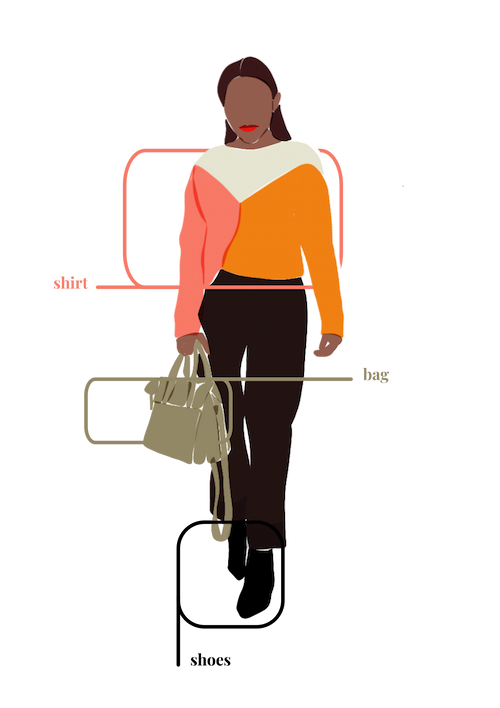- Clothes
- Bags
- Accessories
-
Inspiration
- Shoes
How Do Influencers Influence Fast Fashion (& You)?

Shady partnerships, Shein hauls on TikTok, never showing the same outfit more than once on their Instagram feed…
Influencers are fuelling fast fashion and making it even faster (as if the speed of this industry weren’t already unsustainable!).
Here’s why and, most importantly, how you can break free from that “influence”.
How influencers make fast fashion even faster (and shadier)
There are so many problems with fast fashion that we could write an entire article about it (actually, we did).
But in a nutshell?
- It has a terrible environmental impact (from 92m tonnes of waste every year to carbon emissions and water pollution… and more!), and it even contributes to climate change
- It hides a high human cost, like sweatshops, child labour, and workers trapped in modern slavery conditions
- It affects your brain and keeps you trapped in a vicious cycle of NEEDING to buy new clothes to feel happy or worthy
So, we can agree that fast fashion is incredibly problematic to say the least, right?
But how do influencers contribute to it and make things even worse?
Let’s see.
Influencers and overconsumption

A lot of fashion influencers rely on a type of content that encourages and glorifies overconsumption.
For example, this can include:
- Hauls – These unsustainable trends started on YouTube in the early 2000s and are now growing on TikTok, especially ‘Shein hauls’ (that hashtag alone has over 895K posts!)
- Trendy clothes for trending content – Influencers often purchase new items just to film one video—like a ‘What I’d wear to’ challenge—which encourages their followers to do the same and see clothes as disposable
- Recommendations and micro-seasons – How many times have you seen posts and videos along the lines of “5 items you NEED in your wardrobe” or “7 new must-haves from Zara”? This fuels the cycle of buying new clothes regularly, moving from 2 main seasons a year to weekly ones
- New outfits – Influencers also tend to show up with different outfits almost every day, especially on their Instagram feed. This promotes the toxic mindset that you shouldn’t be seen in the same clothes too often
- Buying for all the wrong reasons – Through their content, influencers reinforce the idea of buying clothes to match an identity, as “shopping therapy”, to belong, or to feel worthy. This pushes consumers to purchase new garments to try and fill a void, which can keep you trapped in a vicious cycle and have a negative effect on your mental health
86% of this survey respondents admitted to buying fashion apparel after seeing those garments and accessories on an influencer. So, their content clearly works—in the sense that it does influence people. But at what cost?
Collaborations and partnerships with problematic fast fashion brands

Fast fashion and especially ultra fast fashion brands rely heavily on influencers to reach new consumers. This tends to involve:
- Gifted items and sponsored posts – The majority of clothing collabs with influencers are made by fast fashion bands like Shein, Zara, and FashionNova. So, by promoting them, influencers fuel the culture of buying new clothes without worrying about how and by whom they were made
- Affiliates – Many influencers also rely on Amazon storefront links or custom codes to promote these brands. So, they obviously fuel overconsumption even further (= the more their followers buy, the more they earn)
- Greenwashing – Many fast fashion brands rely on vague (or downright fake) promises and statements on how eco-friendly they are. When collaborating with them, influencers tend to repeat and amplify them. Plus, influencers are also handpicked by brands trying to present themselves as ethical and sustainable... even when they're the complete opposite! For example, think of Boohoo’s partnership with Kourtney Kardashian as its “sustainability ambassador” (ironic, when its entire business model is based on churning out hundreds and sometimes thousands of new products every week) or Shein’s influencer trip to its “innovation centre” in China (when this brand is notorious for its sweatshop scandals and violating labour laws)
Are all fashion influencers to blame?
Not at all!
From TikTok to Instagram and their own blogs, there are also many influencers who use their platforms to:
- De-influence, advicing their followers against buying certain products
- Shine a light on these brands’ dodgy practices
- Promote an ethical and slow approach to fashion (more on that soon!)
In fact, France’s anti-fast fashion bill could mean that influencers will end up making more partnerships with sustainable brands instead, and we hope more countries will follow.
So, we’re not saying that every single one of them is part of the problem. However, influencers are some of the biggest players when it comes to making fast fashion even faster and more popular, especially on social media.
How you can stop being influenced by fast fashion influencers

Be mindful of what you consume online!
- Unfollow fast fashion influencers – As well as removing those who collaborate with brands that don’t align with your ethos, ask yourself: “When I consume their content, do I feel better or worse about myself?”
- Engage with different types of content – For example, you could stop interacting with hauls and look for more ethical topics instead (like de-influencing and sustainable fashion). The algorithm will start showing you more of the latter
- Follow more ethical fashion influencers and accounts – Not all influencers are about overconsumption and dodgy brand collabs! There are plenty who promote repeat outfits, collaborate with sustainable brands, show you how to use your existing clothes to create new outfits and, overall, to make you feel GOOD about your wardrobe (and yourself!)
Some of our favourite sustainable fashion bloggers and influencers are:
- @According.to.lex, helping you break up with your fashion addiction
- @the_rogue_essentials, focusing on slow fashion
- @acteevism, tracking what she wears and sharing practical slow fashion advice
- @ajabarber, covering fashion from an intersectional point of view
- @style.withasmile, sharing stories about vegan and ethical fashion
You can also find lots of sustainable fashion inspiration and brand recommendations on our own Instagram @project_cece
Overall, we believe influencers are making fast fashion even faster, but you don't have to keep letting them influence you.
Share our story
Project Cece is a platform that collects ethical fashion from vetted brands and shops in one place. Browse ethical fashion for women and men and find items that fit your style, budget and values!

_large.png)